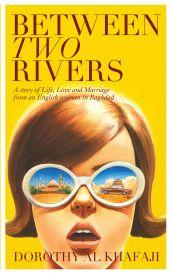With its bright yellow cover and a back page that reads very much like the synopsis of a great romance, I thought this book was some kind of chick-literature. However, opening the front page and reading the introduction, it is clear that the book is based on the true memoirs of the English Dorothy Al Khafaji, who was born and bred in Somerset, England but through extraordinary fate, had to travel to and live almost two decades in Baghdad, Iraq between 1962 to 1980.
The tale begins when Dorothy, an impressionable young girl who hasn’t even finished her A-Level education, falls in love with the handsome and dark Iraqi engineering student Zane in a London club. Soon after, they are married with a little daughter and on their way to Baghdad with no questions asked.
Their adventure starts in a fancy Mercedes picked up from Germany (for Zane’s brother) and they drive all the way through Europe and Asia to get to Iraq; passing Holland, Austria, Bulgaria, Yugoslavia, Turkey, Jordan and Syria. When they finally arrive, the young family live with the in-laws in a pretty suburb of Baghdad near to the Tigris River.
Al Khafaji is quickly thrown into the very different patriarchal and conservative culture and has no option but to adapt. She writes in detail of her life then as a young mother away from all that was once familiar to her in England. With almost zero contact with the Western world and so far away, she learns the Arabic language and picks up on the local habits in order to personally survive.
We get a wonderful insight into life of the ordinary but dignified Iraqis during the 1960s and a country full of hope. We come to witness through Dorothy the lifestyle as well as the passionate temper and irrational family traditions they follow. She tells of her new living arrangements and how safe and friendly their neighborhood was like, with people of all backgrounds living in peace together, without any conflict based on religious, ethnic or political grounds.
She even becomes one of the extended family members and refers to the in-laws as Mum and Dad throughout the story; but, this is not to cover up the dramas and the heated arguments that take place between the brothers, sisters and parents which test her patience and diplomacy skills to the limit in order to keep things under control.
Dorothy and Zane go on to have more children and face lots of obstacles in getting to a state of financial independence, as they relocate on several occasions and have to mix with different families. But the central relationship does comes across a little strained and difficult with plenty of complaint from Dorothy, albeit restrained, regarding Zane.
We do get a great glimpse also of the popular Arabic culture in those days and the various phases that impact on the lives of everyone over an eighteen-year period. But, of course, it is in the politics of the Middle East and the situation of Iraq in particular that begins just as background information to events, but later comes to affect and colour the personal lives of all characters involved.
It was this part of the book most enjoyed as Khafaji writes it so well; although, it could not have been easy to live through the terror, horror and injustices that were caused by the Baathist government that took hold. Ending with the sadistic regime of Saddam Hussein, we understand just how mercilessly it threatened the life of every single person who either lived in or originated from Iraq.
I do recommend reading this book, as it weaves the personal with the political in a fluent and measured fashion. It does shine a light on a time in Iraqi history that tested the nerve and steel of ordinary people. With so many crimes committed against the innocent, Dorothy herself is a survivor who has lived it and can now tell the tale for others to contemplate any lessons that might help to heal today’s post-Wars Iraq.
Between Two Rivers will soon be available on paperback, priced at £8.99. ISBN 9781908946874
Note: Note: This article was first published circa June 2013


